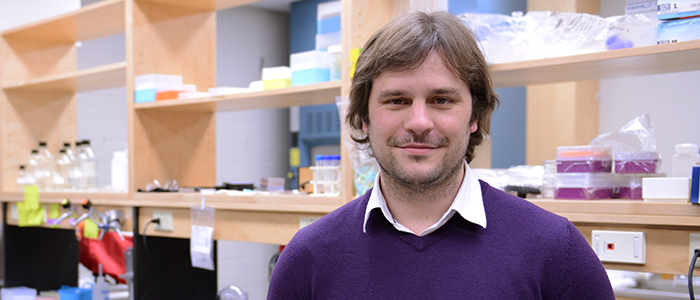Little insect, big potential: Using fruit flies to study Intellectual Disability

Jamie Kramer’s eyes light up when he speaks about his research involving Intellectual Disability (ID) and its relation to the field of neuroepigenetics.
“There is a lot of information coming out in the field of neuroscience that shows the role of epigenetics in memory and different aspects of the brain,” Kramer, PhD, said.
Kramer first became interested in studying the epigenetics of ID during his postdoctoral fellowship at Radboud University Medical Center in the Netherlands. it was there that he first had the opportunity to analyze genes involved in ID. He also did some studies with fruit flies that were some of the first to look at genome-wide epigenetic profiling in combination with learning, memory and behaviour.
Since joining the Department of Physiology and Pharmacology, he has continued working on projects that study the role of epigenetics in learning and memory in fruit flies.
“My goal is to study all of the epigenetic regulators in fruit flies, but right now we are focusing specifically on one complex that has about 15 sub-units,” he explained. “The fourth-year honours undergraduate students in my lab are knocking down the individual sub-units in the brain of the fruit flies and looking at learning, memory and normal development.”
One way the Kramer Lab has studied learning and memory is by looking at male courtship behaviour.
When a naïve male fruit fly sees a female, it will start courting. Sometimes the female will mate with them, but if a female has already mated she will reject the male’s courtship attempts. If the female keeps rejecting the male, the male learns there is no point in trying to court anymore and will reduce his courtship behaviour.
“We make videos of the fruit flies and we also have an automated tracking system to identify how often a male will court in a ten-minute period,” he said.
Kramer explained there is currently no therapy for ID, and there is not much known about the underlying mechanisms. He explained that this research will help to better understand what the ID genes are doing in the brain, which may help with treatment in the future.
He is also doing some human genetics work to learn more about the genetic causes of ID by screening for mutations in certain genes that are involved in epigenetic regulatory complexes. He hopes this will help with diagnostics.
Even though Kramer does not have personal contact with the patients and families affected by ID, some of his colleagues do. One of the reasons he is so passionate about the research he is doing is because of how excited the families get when they find out someone is working on the gene involved in a disorder their child has.
“I think the more we view ID as one common disorder, rather than a lot of separate rare diseases, the more we can make an impact by understanding common processes underlying genetically variable disorders,” he said.








